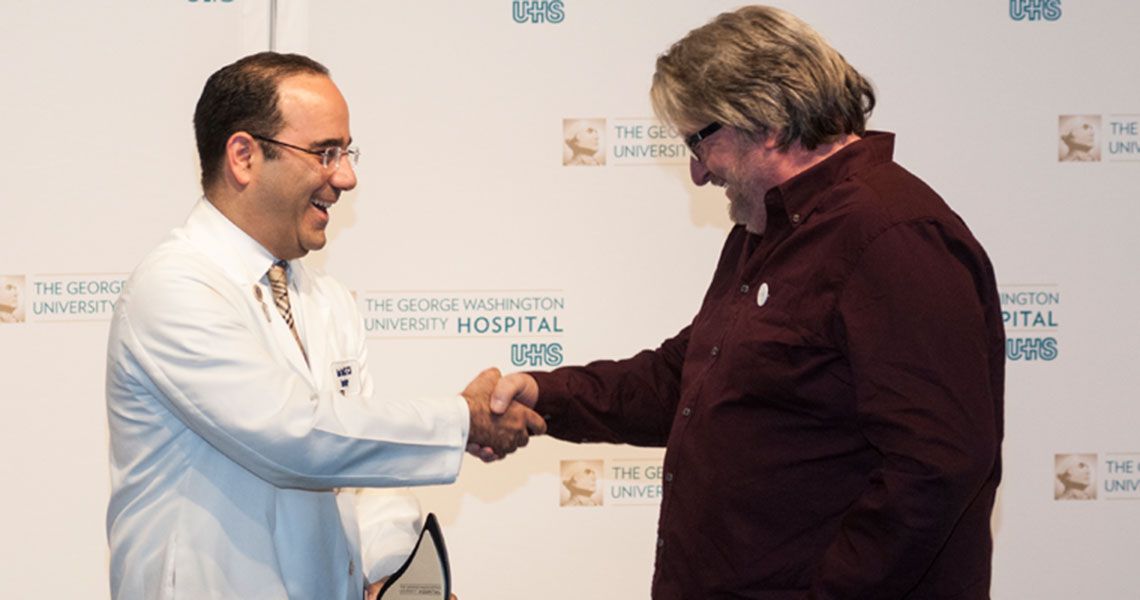Twenty-three-year-old Shaughn Berry wasn’t supposed to live after a cinder-block wall fell on top of him in October 2013. The wall crushed his chest and partly tore his liver from his vena cava, the body’s largest vein.
Mr. Berry was rushed to George Washington University Hospital where he received more than 100 units of blood from the hospital’s blood bank. Then doctors re-implanted his liver.
“In total, the way we approached Shaughn is no different than the way we approach our wounded in battle,” said Babak Sarani, director of trauma and acute care surgery at the GW Medical Faculty Associates. “A blast that causes such devastating injury to a young soldier—and here Shaughn comes in, as a very young guy, essentially with the same type of injury.”
The injuries Mr. Berry sustained, Dr. Sarani said, have a near 100 percent mortality rate. But with a coordinated effort from surgeons, nurses, anesthesiologists and many others, Mr. Berry lived.
And one year later, he returned to GW Hospital in good spirits, where he reconnected with the staff who saved his life and aided in his recovery.
“That’s the first time I heard my liver was detached from my body. That’s very interesting,” Mr. Berry said with a grin. “I just want to say thanks to the team and Dr. Sarani. He’s probably one of the most exceptional guys I’ve ever met.”
Mr. Berry was one of seven patients who were honored at the hospital’s third annual Trauma Awareness Day on Tuesday. The event offers a unique opportunity for both patients and hospital staff to show appreciation for the ways they have touched each other’s lives.
For those seven patients, and all the others who have experienced a traumatic injury, they woke up on the morning of their catastrophic accident expecting an ordinary day. And then—on their way to work, or school or play—they were hit with an “an abrupt, cataclysmic change,” Dr. Sarani said on Tuesday.
“This is very different than someone who is diagnosed with a serious medical problem in which there is time to formulate a plan and to establish a relationship with a treatment team,” Dr. Sarani said. “It’s a great privilege to have patients and families who don’t even know us put their trust in us at a moment’s notice.”
He attributed their successful recovery not only to the dedication of the hospital staff, but also to the patients’ positive attitudes—and their wills to live.
“They just knew they were going to live. They just did,” Dr. Sarani said. “At no point in time did anyone ever say, ‘I’m just going to give up. I’m hurt, I’m tired.’ And you can imagine the degree of pain and suffering.”
Exactly one year ago, Wayne Millner made national headlines when a zebra bit and kicked the zookeeper at the National Zoo. Mr. Millner arrived at GW Hospital the same morning that the American College of Surgeons was there to verify the Trauma Center.
“The only thing more stressful than providing care for an injury you’ve never actually seen before in your life, like a zebra attack, is doing it while the verifying body watches you,” Dr. Sarani said.
After undergoing numerous operations and multiple skin grafts —a combined effort of surgical services from trauma, plastic surgery, orthopedics, therapists and pain medicine—Mr. Millner was discharged from GW Hospital after two weeks. The former zookeeper, who appears to have fully recovered, is now happily retired.
“I’m going to cry,” Mr. Millner whispered as he joined Dr. Sanari at the front of the GW Hospital auditorium.
Mr. Millner said he was surprised when nurses asked him how he remained so cheerful during his recovery.
“I said, well, why wouldn’t I be?” Mr. Millner said. “I mean, I need you. Thank God you’re here.”
After she crashed her motorcycle last fall, Tabatha Bradsher was rushed to GW Hospital. There, the trauma team discovered one of the worst cases of a rib fracture they had ever seen. Her right knee had also been dislocated with injuries to the ligaments. As the only hospital between Richmond and Baltimore that routinely reconstructs such traumatically injured rib cages, the trauma team employed advanced techniques, including ketamine infusion treatment, a rarely used drug that allows doctors to control a patient’s pain without putting her in a coma.
Ms. Bradsher arrived at Tuesday’s event in a wheelchair. She said she has spent untold days at GW Hospital since her accident, and she will be back on Thanksgiving to undergo yet another surgery.
But this holiday, Ms. Bradsher knows she has a lot to be thankful for.
“For me, to have survived falling off of a bridge, it feels really nice to be here,” Ms. Bradsher said. “I’m very grateful. And what gets me through it is to take things not so seriously. I’m going to be here for Thanksgiving, but maybe the mashed potatoes will taste good,” she said with a laugh.
“I’m hoping for things like that. This has all been very humbling.”



